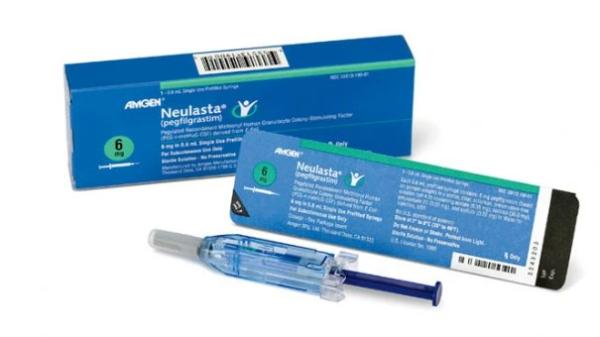Neulasta Disease Interactions
There are 3 disease interactions with Neulasta (pegfilgrastim).
CSF (applies to Neulasta) glomerulonephritis
Major Potential Hazard, Moderate plausibility. Applicable conditions: Renal Dysfunction
Although it has been reported that renal dysfunction has no effect on the pharmacokinetics of colony stimulating factors (CSF), filgrastim and pegfilgrastim may cause glomerulonephritis. Symptoms include swelling of the face or ankles, dark colored urine, or blood in the urine, or a decrease in urine production. Advise patients to report signs or symptoms of glomerulonephritis immediately. Monitoring of patients with renal dysfunction is recommended.
References
- "Product Information. Neupogen (filgrastim)." Amgen PROD (2002):
- "Product Information. Neulasta (pegfilgrastim)." Amgen (2002):
- "Product Information. Granix (tbo-filgrastim)." Teva Pharmaceuticals USA (2013):
CSF (applies to Neulasta) myeloid tumors
Major Potential Hazard, Moderate plausibility. Applicable conditions: Myeloproliferative Disorder
Colony stimulating factors primarily stimulates the proliferation of neutrophils but may also, theoretically, enhance tumor growth, particularly in myeloid malignancies. Therapy with these drugs should be administered cautiously in patients with myeloid tumors. Additionally, if used for PBPC (peripheral blood progenitor cell) collection in such patients, tumor cells may be released from the marrow and collected in the leukapheresis product. The effect of reinfusion of tumor cells is uncertain at this time.
References
- "Product Information. Neupogen (filgrastim)." Amgen PROD (2002):
- "Product Information. Neulasta (pegfilgrastim)." Amgen (2002):
CSF- leukocytosis
Major Potential Hazard, Moderate plausibility.
Filgrastim and pegfilgrastim are growth factors for neutrophil progenitor cells. Therefore, these should not be used in patients with leukocytosis. If excessive white blood cell counts occur during CSF therapy, treatment should be interrupted or the dosage reduced.
References
- Hollingshead LM, Goa KL "Recombinant granulocyte colony-stimulating factor (rG-CSF). A review of its pharmacological properties and prospective role in neutropenic conditions." Drugs 42 (1991): 300-30
- "Product Information. Neupogen (filgrastim)." Amgen PROD (2002):
- "Product Information. Neulasta (pegfilgrastim)." Amgen (2002):
Neulasta drug interactions
There are 172 drug interactions with Neulasta (pegfilgrastim).
More about Neulasta (pegfilgrastim)
- Neulasta consumer information
- Check interactions
- Compare alternatives
- Pricing & coupons
- Reviews (70)
- Drug images
- Side effects
- Dosage information
- Patient tips
- During pregnancy
- Support group
- Drug class: colony stimulating factors
Related treatment guides
Drug Interaction Classification
| Highly clinically significant. Avoid combinations; the risk of the interaction outweighs the benefit. | |
| Moderately clinically significant. Usually avoid combinations; use it only under special circumstances. | |
| Minimally clinically significant. Minimize risk; assess risk and consider an alternative drug, take steps to circumvent the interaction risk and/or institute a monitoring plan. | |
| No interaction information available. |
Further information
Always consult your healthcare provider to ensure the information displayed on this page applies to your personal circumstances.


